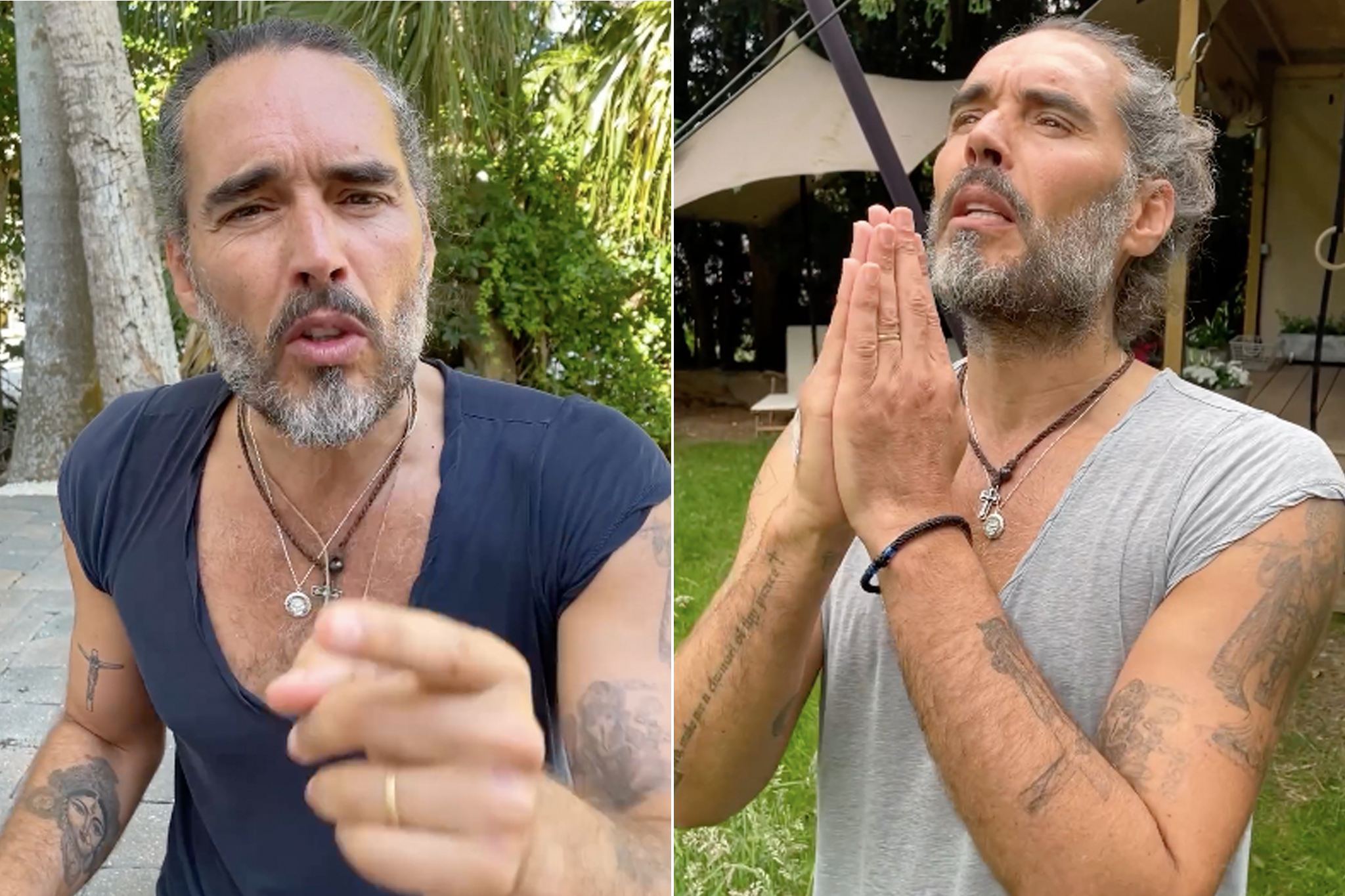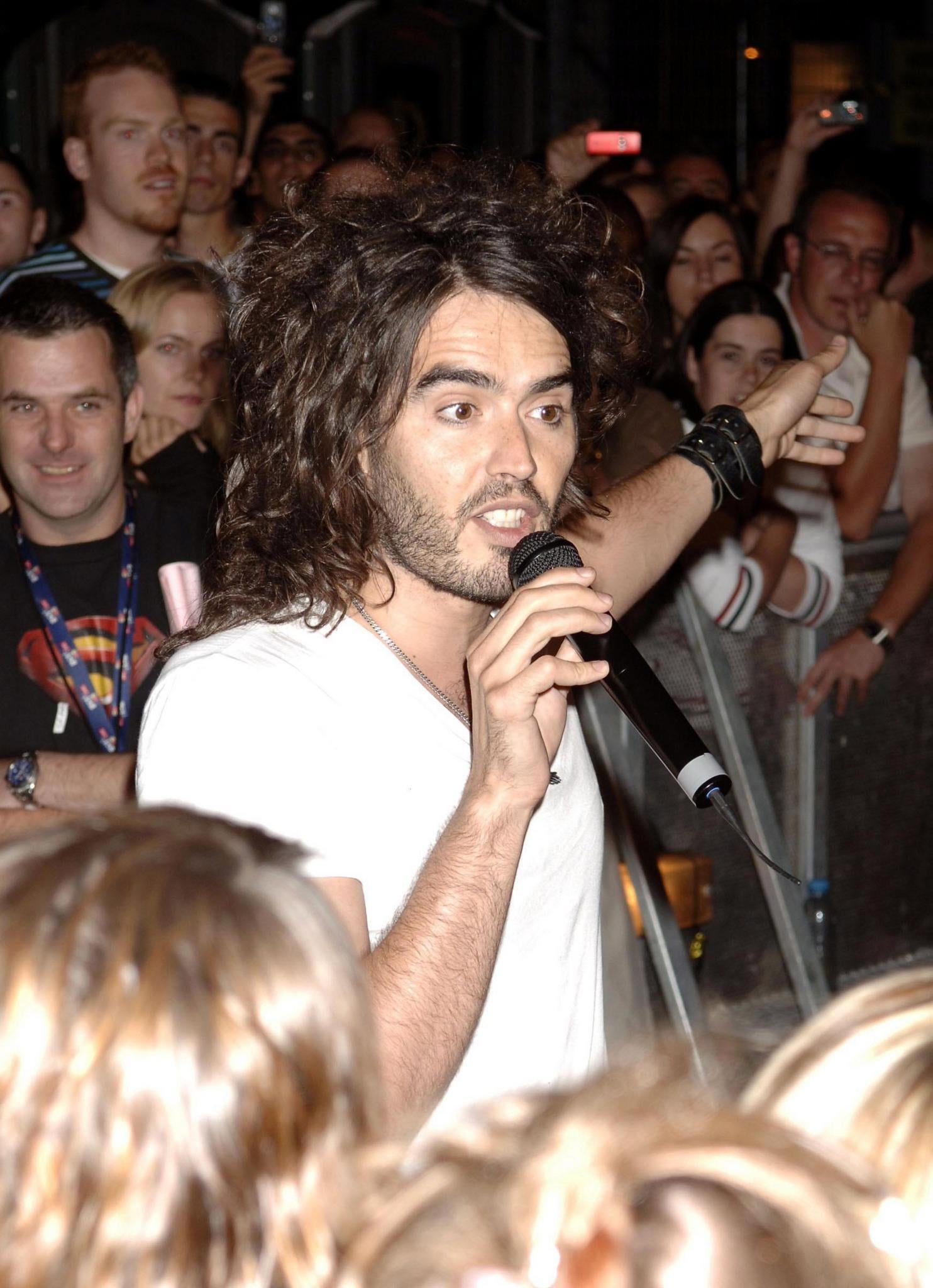Russell Brand’s ‘Jesus’ complex is complete and fuelled by right-wing conspiracy theories
As Russell Brand is pictured conducting a baptism not long after he was seen praying against “dark and demonic” forces at an event hosted by US political commentator Tucker Carlson, Zoë Beaty looks at how this left-wing Corbynite reinvented himself as a born-again Christian and poster-boy for conspiratorial right.


Russell Brand is undergoing a transformation. So far, he’s had a few. Over the years, he’s been a comedian, a host, a disgraced radio DJ, an actor and a YouTuber. Back in the days when he was Katy Perry’s husband, he was into Hinduism, before that, he dabbled in being Hare Krishna.
“I’m a spiritual gent and increasingly that’s the level I want to vibrate on, were it not for my crazed lust for sex and glamour,” he said of himself in 2008. Last year, a Channel 4 investigation alleged he is a rapist and a sexual and emotional abuser after four women came forward to accuse him. He denied the allegations. Now, Brand’s a reborn Christian and a “deep-state”, “plandemic” conspiracist.
This weekend, the 49-year-old who was baptised himself in April, posted pictures on his Instagram account showing him baptising another man in a lake wearing nothing but a white pair of underpants. His caption read: ‘It might seem a bit soon to be baptising people, but the Apostles did it on day one, so here we are.’
It followed an earlier video posted on Youtube in which he quoted from the Bible, doubling-down on his reinvention as a staunch Trump supporter in July, when he nestled up to Maga heavyweights at the Republican National Convention in Milwaukee. It wasn’t completely out of the blue: the 49-year-old had already endorsed the presidential candidate on his podcast, Stay Free with Russell Brand. “If you care about freedom, I don’t know how you could do anything other than vote for Donald Trump for precisely the reasons that they claim that you can’t,” he said, in his typical rambling style.
Still, his appearance at the RNC was surprising – and Brand wasn’t the only revelatory attendee. American model and TV personality Amber Rose also took to the stage alongside Eric Trump, Mike Pompeo and Hulk Hogan to proclaim that “the media lied to us”.
“I’m here to tell you, no matter your political background, that the best chance we have to give our babies a better life is to elect Donald Trump president of the United States,” she said in her speech. Rose added that she underwent a recent realisation. “These are my people,” she said. “This is where I belong.”
Before coming out in favour of the right, Rose, who famously dated Machine Gun Kelly and Ye (formerly known as Kanye West), was the pioneer of the anti-rape “Slut Walk”, and a vocal abortion rights advocate. Now, along with Brand, she is shoulder to shoulder with Trump, a powerful, criminal, sexual predator, who vowed to overturn Roe v Wade; the epitome of everything she once stood against.
Brand, to be fair, has never stood for anything for very long. Over the years his shapeshifting persona has served to deflect from countless controversies: the day after the 9/11 attacks, when he turned up to work dressed as Osama Bin Laden; being sacked from Radio X after reading pornographic material on air a year later. Then there was Sachsgate – when he and Jonathan Ross left offensive voicemails to Andrew Sachs in reference to Brand’s relationship with his granddaughter, Georgina Baillie.
But then last year, it seems, Brand’s capacity for mainstream redemption met its match. When four women – one of whom says Brand groomed and assaulted her at age 16, whom he called “The Child” – came forward to accuse him of sexually assaulting and raping them, Brand’s defence became conspiracy. “Is there another agenda at play?” he asked on his YouTube channel, in anticipation of the allegations surfacing. It was Elon Musk and Andrew Tate who came out in support of him.

By then, Brand had already laid the foundations for his new identity – a rich breeding ground of conspiracy theory, casting deep scepticism of the media. To those who followed him, the allegations were easily explained. “Criticise the drug companies, question the war in Ukraine, and you can be pretty sure this is going to happen,” Tucker Carlson wrote in support of Brand.
Brand had indeed questioned the war in Ukraine – along with Covid, vaccines, and “institutional lying” from the mainstream media – on his YouTube channel, which he turned to when mainstream media stopped employing him. From 2021, the former comedian began posting videos like “The Great Reset is HAPPENING” and “The Great Reset is NOT a conspiracy!”, racking up millions of views. By 2023, Brand’s most popular guests – Tucker Carlson for example – were increasingly on the far right and were distrusting of the media. When the allegations surfaced, his stage was already set.
“Conspiracy theories of course allow you to deflect from any of your own shortcomings,” says Dr Mikey Biddlestone, postdoctoral researcher on the University of Kent CONSPIRACY_FX team. “So if you do anything wrong, or if you’re corrupt, you can always say, ‘Oh it was the deep state that did it’.
“It can be quite a strategic thing to do, where you position yourself as a maverick intellectual – someone that the deep state wants to silence.”

Perhaps Brand really is the victim and protagonist of a global conspiracy – or perhaps he’s dabbling in a method tried and tested by many men presented with sexual misconduct allegations before him. The thing is, it’s working. Now, with his Jesus-like image still firmly intact, he’s the sacrificial lamb.
Ask his followers and he’s no predator. Rather, he’s a magnanimous “truth-seeker”, a “free-thinker” under threat of being gagged, despite no one being able to silence him thus far. Turning to conspiracy is a tactic that often works well in political spheres, Biddlestone says, because “[politicians] can position themselves as a unique outsider that’s able to enact change. For the minority group, you end up creating this perception of yourself as a saviour who is trying to save the world with your benevolent views; the benevolent antidote to an unjust world. Conspiracy theories can be really effective in appealing to people’s emotions and morality.”
Feeling injustice often means feeling unsafe – which is where conspiracy can become particularly powerful. It plays into the idea that there is something unknown to fear; some research suggests that those more likely to invest beliefs in this world are seeking some sort of control. Funnily enough, it’s not dissimilar to a conservative mindset.
“Conservatives tend to be more concerned about safety, certainty, order,” Biddlestone explains. “From a psychological perspective that means they want to compensate for these feelings of fear and uncertainty more so than people who are not conservative. “It tends to make them more vulnerable to adopting these beliefs that have a broad answer to the world – something that feels safe, and is the answer to these scary questions. I’d say that’s also true of conspiratorial and religious beliefs.”
The more you look, the more a grim Venn diagram of conspiracy, the right-wing and Christianity appears. And Brand has now joined fellow recent convert Elon Musk and far-right conspiracist Alex Jones, right in the centre of it.
Absolving himself of past sins, cleansing himself in the murky waters of the Thames was the last piece of the puzzle. But while Brand’s baptism might seem out of the blue, he might actually be a notable example of Christian nationalism making its way over to Britain, says Dr David Robertson, of the Open University.

“What’s interesting at the moment is the way that there’s a really strong resurgence of Christianity,” he explains. “In the US, there’s a strong sense of Christian nationalism, even theocracy. In someone like JD Vance, for instance, there’s this idea that Christianity is not only important to the US but the mission.”
It’s a sentiment that was central to Trump’s Maga movement in 2016 – unsurprisingly, Reform UK MP Nigel Farage followed suit. “We are a Christian country, with a Christian constitution and a Christian monarch,” he said. “I absolutely believe in Christian values that have made this country great,” before the general election. For the far right – and conspiracists alike – religion-washing is a powerful tool for shutting down conversations that don’t fit the narrative.
Which, says David Aaronovitch, serves Brand’s current predicament nicely. “Brand is a grifter,” says Aaronovitch, author of Voodoo Histories: How Conspiracy Theory Has Shaped Modern History. “He has done what is necessary in order to make money out of it. What he’s found is that certain sorts of ways of being earn you very high levels of support, and therefore monetisation.”
Brand’s past as a reformed addict – and his consequential discovery of spirituality – is a particular type of currency, he says. “His form of religiosity combines misogyny and conspiracism which is implicit in some of the new religiosity of people like JD Vance and others around them. I think it feels like they are saying, ‘we are the true rebels taking aim at the liberals and their deconstruction of conventional society’. It is interesting isn’t it – how JD Vance and Russell Brand ended up at the same convention?”
It’s easy to dismiss Brand’s Trumpism and conspirituality as nothing more than publicity-seeking – “I just think he’s a shallow person,” says Robertson. But there is a creeping sense of dread around the whole thing. Scandal after scandal has not yet quashed the Brand of Brand. Still, now he has 2.6 million followers on TikTok and, despite YouTube suspending Brand’s channels from making money from adverts for “violating” its “creator responsibility policy”, his 6.4 million subscribers are still watching.
This new identity, the radical shift from the left to the right, the crucial combination of theology and conspiracy, and the powerful ability to cast doubt on almost anything that comes his way, is extreme but not surprising. Maybe this time, Brand does believe his own waffling spiel – or maybe it’s just another case of him trying on any hat that fits. This may be the second coming of Russell Brand but it’s unlikely to be the last – unless he really is silenced by the “deep state”. Let’s hope it’s soon.





Join our commenting forum
Join thought-provoking conversations, follow other Independent readers and see their replies
Comments